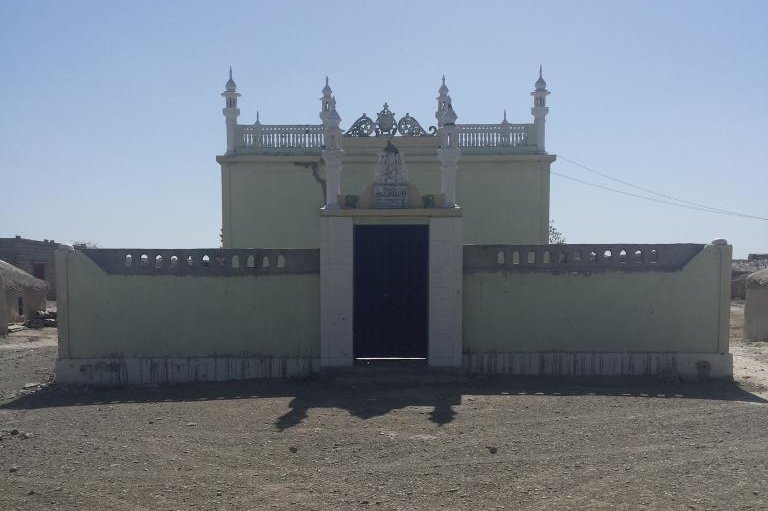1 of 3 | A Zikri mosque in the Awaran district of Balochistan. Photo by News Lens Pakistan
QUETTA, Pakistan, June 18 (News Lens Pakistan) -- Graffiti glorifying the Islamic State in southwestern Pakistan has sparked fear within the tiny 500-year-old Zikri Muslim sect, which has been targeted by hard-line militants, community leaders say.
The country's central government says IS is not active in Pakistan, but a provincial legislator in restive southwestern province Balochistan said extremist organizations operating there espouse a similar ideology.
"The ideology of these Balochistan-based religious and sectarian organizations is the same as that of Islamic State," the legislator, from the provincial ruling party, told News Lens Pakistan. He asked not to be named as he is not authorized to talk to the media.
In August, masked gunmen on motorbikes killed six Zikris during sunset prayers at a mosque in the Awaran district in northeastern Balochistan. Lashkar e Khurasan, a hard-line militant organization, claimed responsibility.
Some 700,000 to 800,000 Zikris are scattered across Balochistan and Sindh provinces in Pakistan and in Oman, Sabir Badalkhan, a former vice chancellor of the University of Balochistan who now teaches at Italy's University of Naples, told News Lens Pakistan.
Badalkhan said Zikris conceal their identity from the Sunni Muslim majority, who account for 90 percent of Pakistan's Muslims.
After the 1947 creation of Pakistan, "They were subjected to forced conversions and attacks by Sunni groups," Badalkhan said.
Under the 1977-88 military rule, Sunni religious parties tried to get the Zikris declared non-Muslim, he added.
The U.S. State Department's 2004 Report on International Religious Freedom put the population size of the Zikris in Pakistan at 200,000, concentrated in the Gwadar district in the province's south.
Shah Bibi, whose father, Bakhtiar, was among the six worshipers gunned down in prayer last August in Awaran, is concerned for her remaining brothers.
Her father received threats after her late brother Raza Jehangir Baloch, a Baloch freedom activist, was killed by soldiers in 2013, she said.
Her fears have increased in light of rumors that violent sectarian organizations active in Balochistan were sympathetic to IS.
"Though my brother was part of the Baloch freedom movement, my father was not. He was our protector. He was the only one to earn a living for our family," Baloch said.
Zikris were attacked two other times in 2014, the Human Rights Commission of Pakistan said in its State of Human Rights 2014 report.
Many Zikris were forced to move from Balochistan to other parts of Pakistan after the attacks, the report states.
"Zikris are very nonviolent and peace-loving people," said Waleed Buledi, 20, a Quetta-based university student from the province's Buleda district.
"They have never initiated any chaos with other sects. Now it is very hard for our community to survive when large numbers of missionaries from the majority sect come to our areas to proselytize and to push our community to convert.
"I don't foresee that Zikris will vanish. We'll try our best to survive with hidden identities."
A Quetta student from the middle-class Baloch community said he is scared to reveal his religion to his teachers and classmates because he is afraid of becoming a target of violence.
Zikris belong to the Sufi strain of Islam. They believe in a 16th century cleric called Imam Mehdi.
"We believe that Imam Mehdi was the last Imam," or cleric, Meerain Baloch, 26, who now lives in London told News Lens Pakistan in a recent Skype interview. "We make pilgrimages to the shrine on the Koh-e-Murad hill near the town of Turbat [in western Balochistan] at the end of every fasting month. This holy place is where we believe that Imam Mehdi spent his final years."
Amnesty International has raised concerns about the targeting of Zikris on the basis of their religious beliefs.
"The plight of the Zikris is a human rights crisis and a dangerous attack on Pakistan's rich cultural and religious heritage," Amnesty's Gulf migrant rights researcher Mustafa Qadri told News Lens by email.
"Zikri people from Makran and in other areas are unable to move freely. Those who afford migration have migrated. Others rely on Baloch nationalist leaders for their safety.
"Abuses perpetrated on the basis of religion and belief have become all too common in Pakistan, with the attackers emboldened by the chronic failure of the authorities to protect vulnerable groups or bring those responsible to justice," he said.
Buledi said he feels that being part of a religious minority means that life could end at any moment.
"You and your family member can be targeted at any time if you are from a minority sect living in Balochistan," he said. "Zikris hide their identities in cities like Quetta because people here in Quetta are very biased and think Zikris are a completely different sect from the mainstream Deobandi and Brailvi sects of Sunni Islam.
"Threats have increased since last year's attacks. We don't feel safe anymore. The only option for Zikris is to hide their identity. Otherwise, we'll be harmed," Buledi said.















